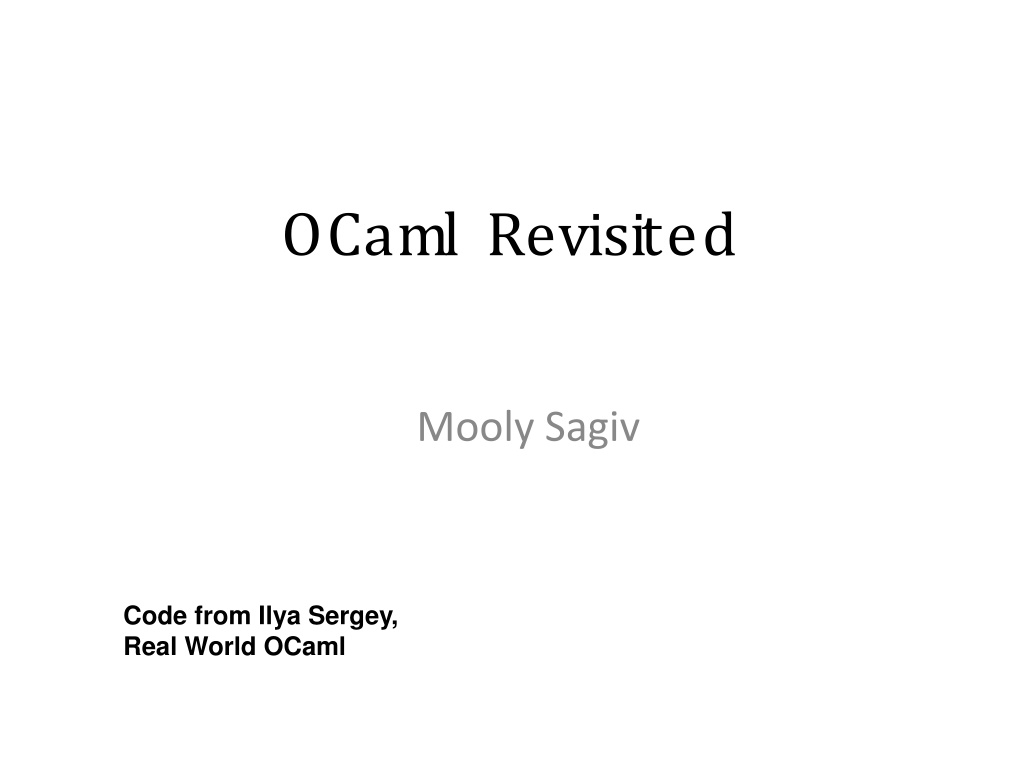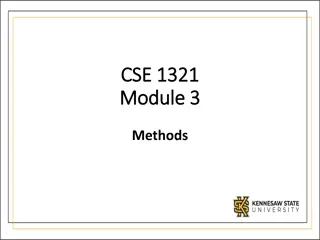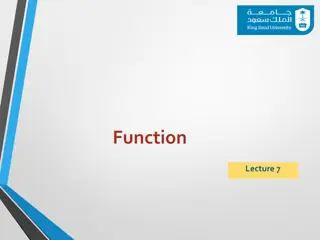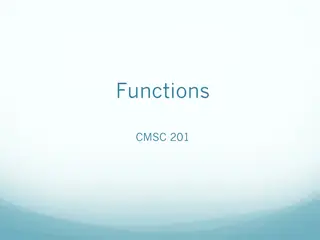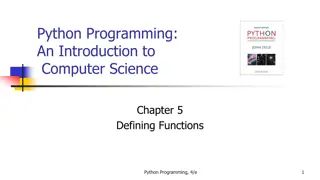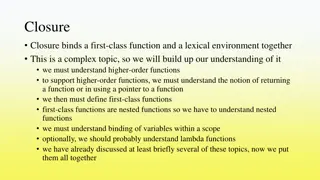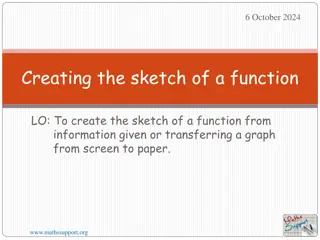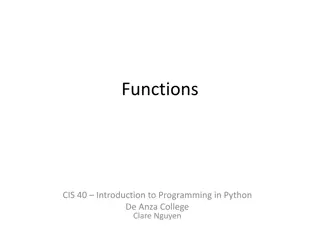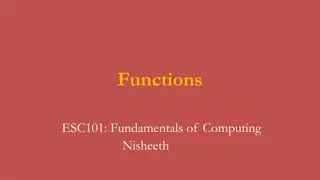OCaml Revisited: Code Examples and Functions Explained
Delve into OCaml programming with code snippets for factorial calculation, working with lists, mapping functions, and more. Explore how to apply functions to lists, append and reverse lists, with a comparison to Lisp. Enhance your understanding of OCaml with practical examples from real-world scenarios.
Download Presentation

Please find below an Image/Link to download the presentation.
The content on the website is provided AS IS for your information and personal use only. It may not be sold, licensed, or shared on other websites without obtaining consent from the author.If you encounter any issues during the download, it is possible that the publisher has removed the file from their server.
You are allowed to download the files provided on this website for personal or commercial use, subject to the condition that they are used lawfully. All files are the property of their respective owners.
The content on the website is provided AS IS for your information and personal use only. It may not be sold, licensed, or shared on other websites without obtaining consent from the author.
E N D
Presentation Transcript
OCaml Revisited Mooly Sagiv Code from Ilya Sergey, Real World OCaml
Factorial in OCaml let rec fac n = if n = 0 then 1 else n * fac (n - 1) val fac : int -> int = <fun> let rec fac n : int = if n = 0 then 1 else n * fac (n - 1) let rec fac n = match n with | 0 -> 1 | n -> n * fac(n - 1) let rec fac = function | 0 -> 1 | n -> n * fac(n - 1) let fac n = let rec ifac n acc = if n=0 then acc else ifac n-1, n * acc in ifac n, 1
Functions on Lists let rec length l = match l with [] -> 0 | hd :: tl -> 1 + length tl val length : 'a list -> int = <fun> length [1; 2; 3] + length [ red ; yellow ; green ] :- int = 6 length [ red ; yellow ; 3]
Map Function on Lists Apply function to every element of list let rec map f arg = match arg with [] -> [] | hd :: tl -> f hd :: (map f tl) val map : ('a -> 'b) -> 'a list -> 'b list = <fun> map (fun x -> x+1) [1;2;3] [2,3,4] Compare to Lisp (define map (lambda (f xs) (if (eq? xs ()) () (cons (f (car xs)) (map f (cdr xs))) )))
More Functions on Lists Append lists match l1 with | [] -> l2 | hd :: tl -> hd :: append (tl l2) val append 'a list -> 'a list -> 'a list let rec append l1 l2 = let rec append l1 l2 = match l1 with | [] -> [] | hd :: tl -> hd :: append (tl l2) val append 'a list -> b -> 'a list
List Example let rec append l1 l2 = match l1 with | [] -> l2 | hd :: tl -> hd :: append tl l2 val append : 'a list -> 'a list -> 'a list = <fun> let x = [2;4] //val x : int list = [2; 4] let y = [5;3;0] //val y : int list = [5; 3; 0] let z = append x y //val z : int list = [2; 4; 5; 3; 0] x y 2 4 (can t tell, but it s the second one) 5 3 0 z or 2 4 5 3 0 x y 2 4 5 3 0 z 2 4
More Functions on Lists Reverse a list let rec reverse l = match l with | [] -> [] | hd :: tl -> append (reverse tl) [hd] val reverse 'a list -> 'a list Questions How efficient is reverse? Can it be done with only one pass through list?
More Efficient Reverse let rev list = let rec aux acc arg = match arg with [] -> acc | h::t -> aux (h::acc) t in aux [] list val rev : 'a list -> 'a list = <fun> 1 3 2 2 2 2 3 3 1 3 1 1
Some Exercises Sum of the elements Drop an element Filter elements Insertion sort
Insertion Sort let rec sort ls = match ls with | [] -> [] | x :: rest -> insert x (sort rest) and insert elem ls = match ls with | [] -> [elem] | x :: l -> if elem < x then elem :: x :: l else x :: insert elem l val sort : 'a list -> 'a list = <fun> val insert : 'a -> 'a list -> 'a list = <fun> sort [2; 1; 0];; - : int list = [0; 1; 2] sort ["yes"; "ok"; "sure"; "ya"; "yep"];; - : string list = ["ok"; "sure"; "ya"; "yep"; "ye ]
Variant Records Provides a way to declare Algebraic data types type expression = Number of int | Plus of expression * expression let rec eval_exp (e : expression) = match e with Number(n) -> n | Plus (left, right) -> eval_exp(left) + eval_exp(right) val eval_exp : expression -> int = <fun> eval_exp (Plus(Plus(Number(2), Number(3)), Number(5))) :- int = 10
Algebraic Type for Naturals type nat = zero | Succ of nat let nat_to_int n = . let int_to_nat n = .
List Algebraic Type type a list = empty | cons of a * list
Binary Search Trees type a bst = Empty | Node of a bst * a * a bst let rec find_max let rec insert let rec delete
Insertion into a sorted tree let rec insert x = function | Empty -> Node (Empty, x, Empty) | Node (l, y, r) -> if x = y then Node (l, y, r) else if x < y then Node (insert x l, y, r) else Node (l, y, insert x r) val insert : a -> a bst -> a bst =
Benefits of Functional Programming No side-effects Referential Transparency The value of expression e depends only on its arguments Conceptual Commutativity Easier to show that the code is correct Easier to generate efficient implementation
Side-Effects But sometimes side-effects are necessary The whole purpose of programming is to conduct side-effects Input/Output Sometimes sharing is essential for functionality OCaml provides mechanisms to capture side- effects Enable efficient handling of code with little side effects
OCaml Features for modularity modules organize identifiers (functions, values, etc.) into namespaces signatures describe related modules abstract types control what is visible outside a namespace
Stack with Abstract Data Types module type STACK = sig type t val empty : t val is_empty : t -> bool val push : int -> t -> t val pop : t -> int * t end module Stack : STACK = struct type t = int list let empty = [ ] let is_empty s = s = [ ] let push x s = x :: s let pop s = match s with [ ] -> failwith "Empty | x::xs -> (x,xs) end
Input/Output print_string: String -> Unit let x = 3 in let () = print_string ("Value of x is " ^ (string_of_int x)) in x + 1 value of x is 3- : int = 4 e ::= ... | ( e1; ... ; en ) let x = 3 in (print_string ("Value of x is " ^ (string_of_int x)); x + 1) Iterative loops are supported too
Refs and Arrays Two built-in data-structures for implementing shared objects module type REF = sig type 'a ref (* ref(x) creates a new ref containing x *) val ref : 'a -> 'a ref (* !x is the contents of the ref cell x *) val (!) : 'a ref -> a (* Effects: x := y updates the contents of x * so it contains y. *) val (:=) : 'a ref -> 'a -> unit end
Simple Ref Examples let x : int ref = ref 3 in let y : int = !x in (x := !x + 1); y + !x - : int = 7
More Examples of Imperative Programming Create cell and change contents let x = ref Bob ; x := Bill ; Create cell and increment let y = ref 0; y := !y + 1; While loop let i = ref 0; while !i < 10 do i := !i +1; i; x Bob Bill y 0 1
Imperative Loops Combine normal control flow structures and functional programming for i = 1 to 100 do Printf.printf ( %d , fact i) done
Imperative Factorial let fact n = let result = ref 1 in for i = 2 to n do result := i * !result done; !result;; val fact : int -> int = <fun>
Fibonacci Numbers A sequence fib0=1 fib1 =1 fibn = fibn-2+fibn-1 1 1 2 3 5
Fibonacci in OCaml let rec fib n = match n with | 0 -> 1 | 1 -> 1 | n -> n * fib(n - 1) let rec fibonacci n = if n < 3 then 1 else fibonacci (n-1) + fibonacci (n-2) let () = for n = 1 to 16 do Printf.printf "%d, " (fibonacci n) done; print_endline "..."
Fibonacci in OCaml let rec fib n = match n with | 0 -> 1 | 1 -> 1 | n -> n * fib(n - 1) How efficient is fib(n)? time (fun () -> fib 20); Time: 0.379086ms - : int = 10946 time (fun () -> fib 40); Time: Time: 4.61983s - : int = 165580141
Memoized Fibonacci let memo_fib n = if n <= 1 then 1 else begin let fib = ref 1 in let fib_prev = ref 1 in for i = 2 to n do let tmp = !fib_prev in fib_prev := !fib; fib := tmp + !fib; done; !fib end
Testing the results let test_fib n = for i = 0 to n do assert (memo_fib n = fib n) done; true time fib 38;; Execution elapsed time: 1.433646 sec - : int = 63245986 time memo_fib 38;; Execution elapsed time: 0.000008 sec - : int = 63245986
Associative Maps type k v assocMap = emptyMap | cons of k * v * assocMap let rec access m index = match m with | emptyMap -> raise (FailWith Element not found ^ (string_of_int index)) | cons(k, v, rest) -> if k = index then v else access rest index let rec set m index newValue = match m with | emptyMap -> cons(index, newValue, emptyMap) | cons(k, v, rest) -> if k = index then cons(index, newValue, rest) else cons(k, v, set(rest, index, newValue))
Arrays A ML module provides efficient constant time array access <array_expr>.(<index_expr>) <array_expr>.(<index_expr>) <- <value_expr>
Array Example let add_polynom p1 p2 = let n1 = Array.length p1 and n2 = Array.length p2 in let result = Array.make (max n1 n2) 0 in for i = 0 to n1 - 1 do result.(i) <- p1.(i) done; for i = 0 to n2 - 1 do result.(i) <- result.(i) + p2.(i) done; result val add_polynom : int array -> int array -> int array = <fun> add_polynom [| 1; 2 |] [| 1; 2; 3 |]; - : int array = [|2; 4; 3|]
In situ reverse let rev_inplace ar = let i = ref 0 in let j = ref (Array.length ar - 1) in (* terminate when the upper and lower indices meet *) while !i < !j do (* swap the two elements *) let tmp = ar.(!i) in ar.(!i) <- ar.(!j); ar.(!j) <- tmp; (* bump the indices *) Int.incr i; Int.decr j done let nums = [|1;2;3;4;5|];; rev_inplace nums;
OCaml Advanced Modularity Features Functors and Signatures Functions from Modules to Modules Permit Dependency injection Swap implementations Advanced testing
Summary Modularity ML provides flexible mechanisms for modularity Guarantees type safety
Summary References Provide an escape for imperative programming But insures type safety No dangling references No (double) free No null dereferences Relies on automatic memory management
Functional Programming Languages PL types evaluation Side-effect scheme Weakly typed Eager yes OCaml OCAOCaml F# Polymorphic strongly typed Eager References Haskell Polymorphic strongly typed Lazy None
Recommended ML Textbooks L. C. PAULSON: ML for the Working Programmer J. Ullman: Elements of ML Programming R. Harper: Programming in Standard ML
Recommended OCaml Textbooks Xavier Leroy: The OCaml system release 4.02 Part I: Introduction Jason Hickey: Introduction to Objective Caml Yaron Minsky, Anil Madhavapeddy, Jason Hickey: Real World OCaml
Summary Functional programs provide concise coding Compiled code compares with C code Successfully used in some commercial applications F#, ERLANG, Jane Street, Scala. Kotlin Ideas used in imperative programs Good conceptual tool
